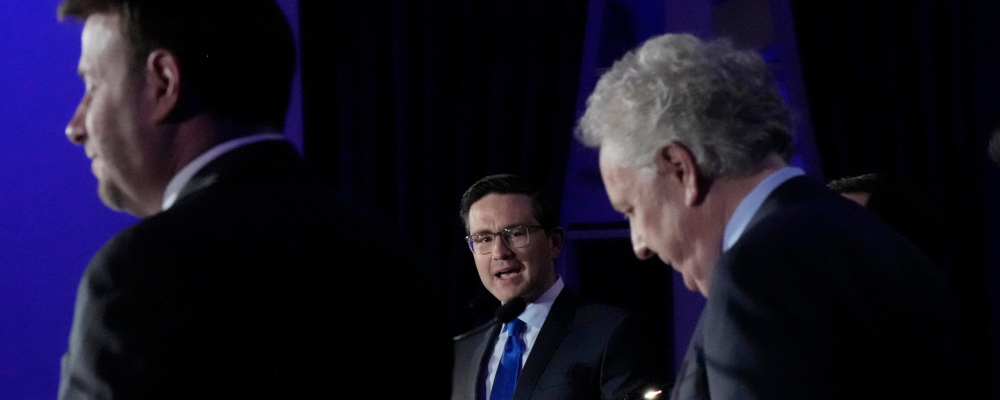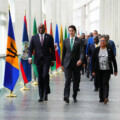As a Jew, I never imagined feeling obliged to frontload the fact of my ethnicity in political commentary, until recently.
As the grandson of Holocaust survivors and as a Canadian proud of this culture’s civility, I never imagined that I’d have to take the time to explain to self-righteous political actors why it’s a bad idea to give marginal racists all the attention they crave, and then some.
And as a media producer, I know that I must qualify these fairly mundane, liberal-democratic opinions with personal disclosures about my cultural background in order to help shield myself from online partisan vitriol that seems to increasingly cast political opponents from certain ethnic groups like my own as more likely than others to be racists, oppressors, and other bad things.
Even Michael Geist, a prominent and widely respected Jewish law professor, was subjected to virulent smears from self-described antiracists when he objected to antisemitism. It was actually a Liberal MP who suggested Geist was a racist this week for asking basic questions about Heritage Canada’s antiracism training scandal and how long the government kept it a secret (it was about a month, at least).
“Blinded by hate for Pablo (Rodriguez, Heritage Minister)? Is it because the Minister responsible looks like this,” angrily tweeted St. Catherines MP Chris Bittle, punctuated by an emoji pointing downward at an image of another minister, Diversity Minister Ahmed Hussen (he had approved the disturbing anti-Israel “antiracism” lectures deployed in Rodriguez’s ministry, the subject of the controversy). Bittle’s tweetstorm, for which he apologized and attributed to “a moment of anger”, was itself an example of misinformation targeted at Geist. It was only Bittle who made an issue of (presumably) Minister Hussen’s skin colour in his performative denunciation of a Jewish professor commenting about issues of concern to Jewish Canadians.
What could possibly possess politicians of all stripes, the centrist-leaning governing Liberals in particular, to signal perceived virtue with such zeal that the signal itself seems bigoted? Had Bittle been paying closer attention to his Liberal colleague Anthony Housefather on Thursday, he may have had a clue.
In an op-ed for iPolitics published the same day, Housefather highlighted the work done by a Canada-U.S. inter-parliamentary task force on online antisemitism, “tracking antisemitic narratives along a broad spectrum of conspiracy theories, disinformation and extremism and they are deeply troubling,” he explained.
“Let’s run through some examples,” Housefather went on, taking the time to denounce Qs, Zs, and various online phenomena linked with antisemitism. Due to the exponential proliferation of online hate, he concluded, “the task force has shown clearly that the era of self-regulation of platforms has abjectly failed. The notion of social media as a public square where speech is balanced by counterspeech fails to reflect the algorithmically amplified threats faced by societies today.”
The solution? Predictably, censorship: to “compel social media companies to take meaningful action against online harms.”
Housefather’s calls for algorithmic transparency make some sense, and mirror longstanding demands of prominent American critics of Big Tech to be forthright about who benefits from disproportionate online virality and who is “shadow-banned” into oblivion. But as his colleagues’ confusion over what constitutes free speech demonstrates, a government of the day cannot responsibly be the arbiter of what is or isn’t acceptable speech due to an all-encompassing, obvious conflict of interest.
The “self-regulation” failure that Housefather describes was never attempted. No Canadian member of Parliament has proposed a workable social media self-regulatory model to address issues like online hate and disinformation. On the contrary, acting on partisan and ideological impulses, both Liberals and Conservatives have willfully ignored the immensely successful and underappreciated Canadian Broadcast Standards Council model, ushered in during the last new media-induced social panic in the early ‘90s (it’s a mostly uncontroversial regulatory framework for live television and radio managed by a coalition of broadcasters and based on the Charter of Rights and Freedoms, and is a good starting point in discussions on social media regulation).
Partisans want control of the internet. They don’t want academics or other independent experts weighing in on speech issues because the resulting legislation will inevitably limit their ability to smear or censor their online opponents, depending on their proclivities. The danger of government-regulated media was just the sort of warning that Geist presented himself before the CRTC in recent months, as he has been likely the nation’s most vocal and prolific critic of the government’s attempts to create an internet censorship apparatus. Fascinating then to see Geist targeted by baseless, borderline bigoted smears.
When a supposed liberal government cannot tolerate polite criticism from an uncontroversial academic, we needn’t look far for examples of how government-regulated social media would be corrosive to democracy.
When Housefather calls for algorithmic transparency, we should ask, for whom?
Nearly anyone can take advantage of a high-volume account to proliferate any message on Twitter, or Facebook. There is no evidence to suggest that the networks afford special privileges to supremacist groups, as Housefather suggests. When organizations like the government of Canada, the Liberal Party of Canada, or the Conservative Party of Canada pour public money into social network ads, they are also participating in a form of algorithm “manipulation,” elevating their messages above competing content. Verified (blue check) accounts, including all MPs, are also boosted algorithmically because they are deemed to have some public interest. Politicians and political parties are already some of the most privileged entities on the internet.
Social network algorithms don’t care about any user’s views, only that they hold as many as possible and in the most polarizing tone possible; ideally in coordination with other high-volume accounts to fuel what the user hopes will trend. Whether the view is virtuous or bigoted, as long as it is polarizing, the algorithms are having their desired effect.
It’s important to acknowledge that if most Canadians are generally tolerant people, then it is safe to assume most interactions with racists on Canadian social media are in the service of antiracism. But in practice, antiracist denunciations don’t work as planned since hateful views are technically promoted with every share, irrespective of the commenter’s framing.
There are a number of classically liberal arguments one could make against the censorship of bad words, bad people, or hate-filled symbols like the swastika; I am certainly not indifferent to a symbol that was used to subjugate my grandparents, turning them from successful entrepreneurs to traumatized refugees, forced to flee to Siberia to stay alive.
What I want for the swastika is for it to disappear, not pop up in my feed every two hours, and the very best way to get closer to that utopic goal is not to “ban” it, even if such a ban were feasible, nor to ritualistically denounce it at every opportunity, but, short of a potentially violent crime being committed, to ignore it and the purveyors of online bigotry as much as possible.
The only argument needed against online government censorship is that it doesn’t work, certainly not when crafted by politicians with illiberal censorship reflexes themselves.
As counterintuitive as it may feel, and as suboptimal as it may be for politicians and partisan influencers craving validation, the most effective way to defeat racists on the internet is to pretend they don’t exist.
As the federal government continues to toy with its improvised fix for what ails the internet, its ministers must be reminded that there is a fine line algorithmically between denouncing and tacitly promoting online hate, and it’s almost certain that virtue-signalling Canadian politicians have done more of the latter than the former.
Recommended for You

Ginny Roth: J.D. Vance, Pierre Poilievre, and how they slice their economic pie

David Polansky: As President Biden leaves the race, will the Democratic Party hodgepodge hold?

RCMP spending to protect MPs may have risen 112% since 2018, as Canadian politicians face greater rise in threats

Adam Zivo: No Dr. Bonnie Henry, drug prohibition is not ‘white supremacy’









